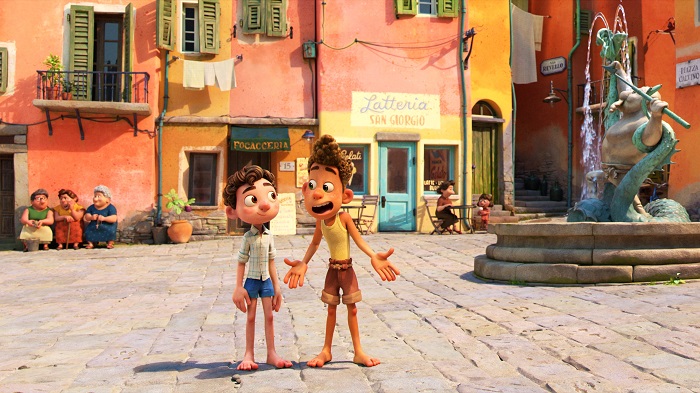Luca (Casarosa, 2021)
Luca is a heartwarming tale of friendship, fear, intolerance, and acceptance set in the Italian Riviera.
If I know America like I think I know America, too much discussion about the film’s universal themes will get derailed by claims and counterclaims about what it is “really” about.
I saw Luca with two different friends, days apart, and both immediately opined that the story was an allegory about kids being gay. It’s easy enough to understand why — there is a lot of talk about kids who are different being “monsters,” about those differences being shameful, about parents abandoning kids or sending them away. And given the quickness with which viewers were willing to queer code Frozen, it’s hard to believe that Pixar was not deliberately inviting this association while deliberately not being explicit about it.
The reason I think such discussions are red herrings is that the film can be understood and appreciated regardless of whether one picks up on or cares about the subtext. Feeling “different,” being ashamed of one’s differences, thinking one is a freak (or “monster”) or not normal is endemic to all kids regardless of sexual orientation. It’s why such themes proliferate in stories for and about kids.
Think of Luca as a boy version of Ariel — he’s intrigued by relics that fall into the ocean and the allure of freedom promised in the human world. He ventures onto land and makes a friend. Saying much more about the plot risks spoilers — and really, when is the essence of a Pixar movie wrapped up in its plot? They tend to be very archetypal: a quest to find something or someone, a lost wanderer trying to get to some version of home, a flawed hero trying to prove himself or herself worthy by overcoming obstacles. Here the last act is structured around the island’s triathlon (swimming, bicycling and….pasta eating?). It’s as generic a plot device as there is, but the emotions emanate from what is at stake for those participating. In order to care about a race, you have to care about the people competing in it, and we do.
Luca doesn’t have the memorable music associated with the most beloved Pixar and Disney films, but it’s gorgeous to look at. The blues and greens dominate and are especially welcome in this age when all must be teal and orange. Also, there is a sense of play and, hence, of joy, that is sometimes missing from young-adult offerings these days. Dystopian fiction with young protagonists has become more common than adventure stories. Not much happens in the second act: Luca learns to walk, he and his friend build a poor-man’s Vespa, and he eats gelato for the first time. Out of such ordinary interactions are the deepest friendships built and the most powerful emotions born.
Finally, as with most Pixar films, the characters are a bit more fully rounded than one usually gets in animated films. There is a rather drab, one-dimensional bully who serves as the villain, but most everyone else in the village (and the movie) is a mix of good qualities and less endearing ones. Ultimately, Luca is maybe a cut below the top-tier Pixar but judged on its own it is a solid success, packed with tender moments about courage, loyalty, and sacrifice.

